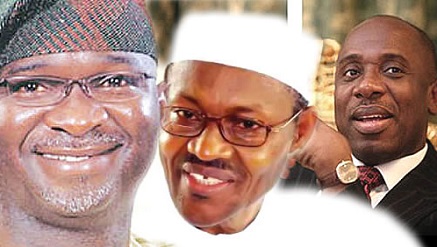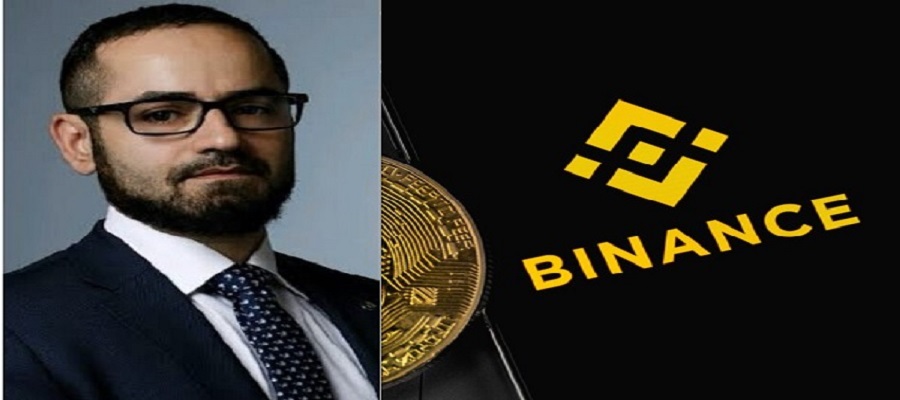News
DSS Accuses APC of Plot to Hack into INEC Database

Department of State Services (DSS) has said that its findings from the search of the Lagos office of the All Progressives Congress (APC) in November last year, alleging, among others, that the party planned to hack into the database of the Independent National Electoral Commission (INEC) to manipulate records.
Marilyn Ogar, DSS deputy director (Public Relations), said at a media briefing yesterday in Abuja, that after preliminary investigations, the DSS “suspects there was an elaborate and well articulated plan to inflate the party’s membership data as well as hack into INEC voter registration database.”
APC however dismissed the findings as hogwash, a great disservice to Nigeria and an embarrassment to all intelligence-gathering organisations around the world.
But Ogar said the raid on the APC’s office was carried out after a tip off that some cloning activities were going on in a building located at No. 10, Bola Ajibola Street, Ikeja, Lagos, without a signpost, banner or flag to indicate that it was a party office.
She said a permit was obtained for the operation during which the DSS officials found some items, which suggested that there was a well-hatched plan to hack into the electoral body’s database and corrupt it “and replace it with their own data.”
The DSS said that from its findings, the APC plans to scythe the system in a way that would enable them to manipulate even media reports in a predetermined direction. Ogar explained that a well articulated manual to perform all these tasks were served on the hard drive recovered from the office.
She listed the items recovered from the APC’s office as “a temporary voter’s card, a permanent voter’s card and some hard drives (one of the hard drives recovered from the building contained a video of twenty-one (21) hacking tutorials.)’’
According to the DSS, the tutorial video focused on how to become a hacker and steps to take to avoid detection in the process of hacking web servers, steps and procedures of system hacking, passwords cracking, decrypting, escalating access privileges, and creating backdoors to servers.
Ogar said the video “also explicitly explained how to evade security of databases such as Intrusion Detection Systems (IDS), firewalls and other measures put in place to deter hackers.
“The video outlined ways to identify vulnerabilities in systems and how to surreptitiously drop a USB flash drive in a target establishment, which when plugged into any computer, transmits malicious codes enough to gain access into and compromise the entire system of the target organisation. And how to hack into the systems of media houses, with the aim of broadcasting fake stories or headlines.”
While displaying pictures of underaged Nigerians allegedly registered as members of the APC, Ogar said registering underaged and infants as party members is contrary to the party’s constitution as contained in Article 9.1 which states that “membership of the party shall be open to any citizen of Nigeria who has attained the age of eighteen (18) years…”
The DSS alleged that: “Furthermore, the APC had multiple registrations of individuals in multiples of 16, 12, and 10.”
According to the DSS spokesperson, it was also discovered that some foreigners as well as security operatives were registered members of the party thereby putting a question mark on their understanding of the legitimate provision that all security personnel in the country must not be or be seen to be partisan.
“The APC registered several security personnel from the Nigerian Army (NA), the Nigeria Police Force (NPF), Nigeria Customs Service (NCS), Nigerian Security and Civil Defence Corps (NSCDC) and Federal Road Safety Corps (FRSC), among others, in their uniforms as members of the party. Several foreigners were also registered as its members,” the agency revealed.
The DSS expressed concern that the APC filled forms without passport photographs, and have books containing names of people with their phone numbers, as well as several envelopes containing passport photographs of various individuals.
While stating the position of the DSS that APC has plans to infiltrate the database of the electoral body “through the creation of party membership forms and cards to match INEC’s voters’ register across the country,” Ogar reiterated that the opinion expressed by some people “on the action of the service” cannot conceal the sacrosanct of truth.
It would be recalled that when the said residence was raided last year, some officials of APC were arrested and detained by the DSS. The party, through its spokesman, Lai Mohammed, came out with a statement demanding public apology from the service and immediate announcement of its findings.
He further accused the service of seeking to manufacture evidence to support its alleged faulty intelligence by delaying the announcement after a number of days.
Mohammed was quoted to have then said: “We are now asking them to immediately announce their findings to the world. After all, it took them only a few hours after their Gestapo-like invasion of our offices before they issued their baseless allegation of PVC cloning to justify their action.”
Ogar said those arrested have being released on bail, investigation is still continuing, as the DSS would take more evidences and the information acquired from some of the suspects to court for further litigation.
In a statement issued in Abuja yesterday by Mohammed, APC also alleged that the timing of the release of the ‘findings’ was a plot orchestrated in collusion with the Peoples Democratic Party (PDP) to distract the APC from its ongoing campaigns for next month’s elections.
It described as disingenuous, flimsy, premeditated, partisan and an irritant the conclusion that the APC had an ‘’articulated plan to inflate the party’s membership data as well as hack into INEC’s voters’ registration database through the creation of party membership forms and cards to match INEC’s voters’ register across the country.’’
The APC statement reads in part: ‘’First the DSS and the PDP said the APC was cloning Permanent Voters Cards at the raided office, without a shred of evidence. Now, after a ‘painstaking’ investigation, the DSS has found out that the APC was only planning to inflate its membership data and then hack into INEC’s database. And this is the outcome of its massive, months-long investigations?
‘’This would have been funny if it were not from a primary domestic intelligence agency saddled with a great responsibility. Can this wishy-washy report stand any serious scrutiny? Can any serious intelligence gathering agency anywhere else in the world take this report seriously? With these kind of findings, one can now understand why Boko Haram has continued to strike at times and places of its own choosing without any prior knowledge by our all-powerful DSS.
‘’We have always warned that our democracy is in clear and present danger, not just from desperate politicians, but also from institutions of state that have compromised in their roles and resorted to crass lawlessness. The DSS’ ‘findings’ today have given us another reason to repeat this.”
‘’While we are willing to meet the DSS in court, we can confidently say that the ‘confessions’ extracted from the arrested persons, after they were subjected to incredible acts of torture, cannot even stand in any court of law,’’ APC said.
News
Binance Chief Insists Some FG Officials, Reps Demand $150m Bribe

Tigran Gambaryan, top official of Binance, at the weekend, maintained his stance on the bribery allegations against some Nigerian government officials and House of Representatives members.

Tigran Gambaryan
Gambaryan insisted Nigerian officials demanded bribes from him despite the denial of the Federal Government.
Recall that Gambaryan, who is Binance’s head of financial crime compliance, was detained in Nigeria from February to October 2024.
Nigerian government said his arrest was part of a broader investigation into alleged money laundering and economic destabilisation attributed to Binance’s activities in Nigeria.
On Friday, while recounting his initial experience on the issue on Twitter, Gambaryan accused some Nigerian lawmakers of demanding substantial bribes in cryptocurrency.
He specifically accused three lawmakers of soliciting a $150 million bribe from him, naming Philip Agbese, Ginger Onwusibe and Peter Akpanke as the three federal legislators who demanded the huge bribe from him to allegedly forestall his arrest and prosecution.
He further alleged that Nuhu Ribadu, National Security Adviser, sought significant payouts from Binance for his political ambition.
But in a swift response, Mohammed Idris, minister of Information and National Orientation, dismissed Gambaryan’s allegations as “outrageous” and “defamatory”.
Idris explained that the Nigerian government had rejected a $5 million offer from Binance intended to secure Gambaryan’s release, opting instead for a more favourable settlement with the US government.
He said Gambaryan’s claims lacked credibility and appeared to be an attempt to discredit Nigerian officials.
But Gambaryan in his latest post on the development on Saturday on his X, said the Federal Government used him as leverage to negotiate a beneficial settlement with the US government.
He wrote, “I was invited by the Nigerian FIU to a meeting in January. Last time I checked, they are part of the Nigerian government. House members also invited us to the meeting. Last time I checked, the legislative branch is also part of the Nigerian government.
“You said the second part was part of a probe? Lol. So when you invited us to a friendly meeting, you even lied about that. I was in a safe house for a month, watching TV, while you were trying to use me as leverage. You then panicked and knowingly charged me with blatantly false accusations.
“So I was released on humanitarian grounds? At least you’re finally admitting the need to release me. Last time you posted, you claimed my health was fine and that there was nothing wrong with me”.
The crypto expert further stated, “You investigated? Yet you didn’t take a statement from me? A person with direct knowledge. What a joke.
“You dragged my name through the mud for the past year with zero evidence against me, nearly killed me, and caused trauma to my family. And now you have the nerve to talk about defamation?
“I’ll put my credibility on the line anytime. In court? You mean like last time, when your attorneys didn’t even show up to the human rights suit in Abuja?
“Get your facts straight. I am done with this foolishness. I said my part. I’ll be off Twitter now since it’s pointless to argue with evil.”
While insisting that his claim was factual despite the denials, Gambaryan added, “What I shared was factual, based on my personal experiences and conversations with those who have direct knowledge of the events I discussed; information that was shared with both Nigerian and US law enforcement.
“So please, allow me to leave this behind and find peace”.
The Binance executive said it was the responsibility of law enforcement agents in both Nigeria and the US to see the investigation into the matter through.
He said he is no longer in law enforcement, adding that the responsibility of seeing this through to a logical conclusion now falls on those still serving in the United States and Nigeria.
He added, “Many requested that I stay on and provide further commentary on the issues I posted about yesterday (Friday). Here’s the hard truth: what I shared was meant to fill in the gaps left by Wired and NPR’s reporting.
“The reality is that last year was incredibly painful for me and my family. I dedicated my life to fighting crime as a Special Agent with the United States Department of the Treasury and as a compliance professional. It was an honour to serve my country and it was a blessing that they came to my rescue and mobilised the full force of the US Government when I was in need.
“Being dragged through court on “outrageous, baseless, and trumped-up charges”, he posited, “didn’t just hurt me but also brought immense pain to my family.
“I don’t want to see my kids cry because I’m not around. I don’t want to see videos of my 75-year-old mother on television in tears. I don’t want to see my wife crying on TV. I want to put this nightmare behind me and move on.”
News
inDrive Unveils Cashless Bank Transfer Feature in Nigeria

inDrive, a global ride-hailing platform operating in nine African countries, has introduced “Light Cashless,” an innovative new payment feature in Nigeria designed to enhance safety and convenience for both riders and drivers.

This solution allows drivers to display their preferred bank details within the app, enabling passengers to copy and paste the information for seamless direct bank transfers—eliminating the need for a traditional payment gateway integration.
By launching “Light Cashless,” inDrive becomes the first ride-hailing platform in Nigeria to adopt this model, reinforcing bank transfers as one of the most trusted and widely accepted payment methods in the country. This feature is now available via the latest inDrive app update and is being rolled out in seven key cities.
This launch brings multiple benefits, including enhanced security by reducing the risks associated with carrying physical cash, greater convenience as passengers can complete payments with just a few taps, and increased financial flexibility for drivers who receive payments directly into their bank accounts without delays or transaction fees.
Additionally, direct bank transfers ensure increased payment transparency, allowing both passengers and drivers to track transactions easily within their banking apps, reducing disputes and ensuring clear financial records.
The introduction of “Light Cashless” aligns with inDrive’s mission to challenge injustice and create a fairer, more flexible ride-hailing ecosystem. The platform remains committed to user-driven innovation, continuously empowering both drivers and passengers with greater control over their ride-hailing experience.
“This new feature is a game-changer for the Nigerian market, where bank transfers are already a trusted and widely used form of payment,” said Timothy, Country Representative at inDrive in Nigeria.
“By eliminating the reliance on cash while avoiding the complexities of integrated payment gateways, we are providing a simple yet effective solution that enhances safety, convenience, and financial efficiency for all users.”
The “Light Cashless” feature is now live in seven major Nigerian cities and will continue expanding across the country. Users are encouraged to update their inDrive app to access this new functionality.
News
TikTok Returns on Apple, Google US App Stores as Trump Delays Ban

TikTok returned to the U.S. app stores of Apple and Google on Thursday as President Donald Trump delayed a ban on the Chinese-owned social media app and assured the tech giants they would not be fined for distributing or maintaining it.

The popular short video app used by nearly half of all Americans went dark briefly last month, before a law took effect on January 19 that requires its Chinese owner ByteDance either to sell it on national security grounds or face a ban.
The following day, Trump signed an executive order seeking to delay the enforcement of the ban by 75 days, allowing TikTok to continue its operations in the U.S. temporarily.
Although TikTok resumed service after Trump’s assurances, Google and Apple kept the app removed from their U.S. app stores.
TikTok, the second-most downloaded app in the U.S. last year, said on Thursday that its latest app was now available for download.
The delay could have been because Google and Apple were awaiting assurances that they would not be prosecuted for hosting or distributing the app, according to analysts.
Trump’s directive said the companies, which run mobile application stores or digital marketplaces where users can browse, download and update apps, would not face penalties for keeping the TikTok app up and running.
TikTok had more than 52 million downloads in 2024, according to market intelligence firm Sensor Tower.
About 52% of its total downloads were from Apple App Store, while 48% were from Google Play in the U.S. last year, Sensor Tower said.
The law that requires ByteDance to sell TikTok’s U.S. assets or ultimately face a ban was signed by then President Joe Biden last April, triggered by national security concerns and fears that China could use the video-sharing app to spy on American users.
The U.S. has never banned a major social media platform and the law that passed last year gives the government sweeping authority to ban or seek the sale of other Chinese-owned apps. Trump said on Thursday that his 75-day deadline on TikTok could be extended.
The turmoil at TikTok attracted several potential buyers, including former Los Angeles Dodgers owner Frank McCourt, who have expressed interest in the fast-growing business that analysts estimate could be worth as much as $50 billion.
Trump has said that he was in talks with multiple people over TikTok’s purchase and would likely have a decision on the app’s future in February.

 General News3 days ago
General News3 days agoResearchers Develop Innovative Treatment for Malaria

 News3 days ago
News3 days agoTikTok Returns on Apple, Google US App Stores as Trump Delays Ban

 E-Financial3 days ago
E-Financial3 days agoAfrican Union Launches Credit Rating Agency to Promote Regional Economic Integration

 General News3 days ago
General News3 days agoNigeria to Host ICEGOV 2025, A Milestone in Digital Governance and Global Leadership

 Broadcasting3 days ago
Broadcasting3 days agoFG Kickstarts Construction of Emerging Technologies Institute in Kano

 General News3 days ago
General News3 days agoMTN Nigeria Foundation Supports Education with Donation of School Supplies to 1000+ Students

 Telecom3 days ago
Telecom3 days agoVisa Launches Report on Digital Payment Landscape in Nigeria, Shows Positive Outlook

 Broadcasting3 days ago
Broadcasting3 days agoFamily Marks one-year Memorial of Late APC Chieftain, Ojougboh with Charity Outreach



























